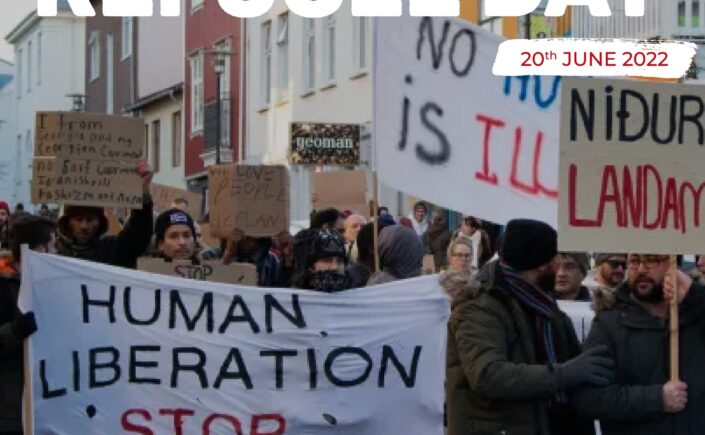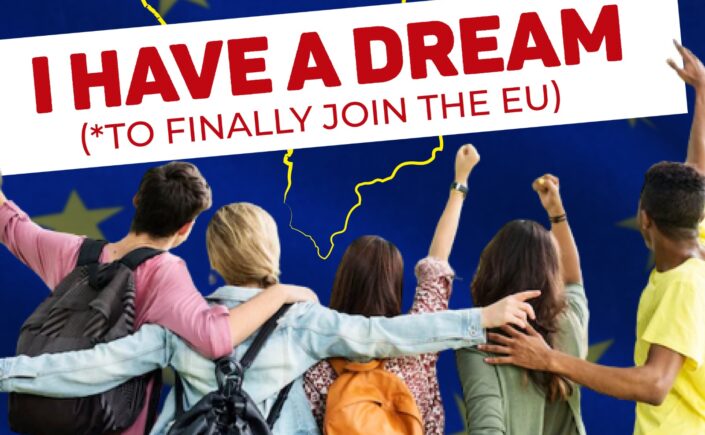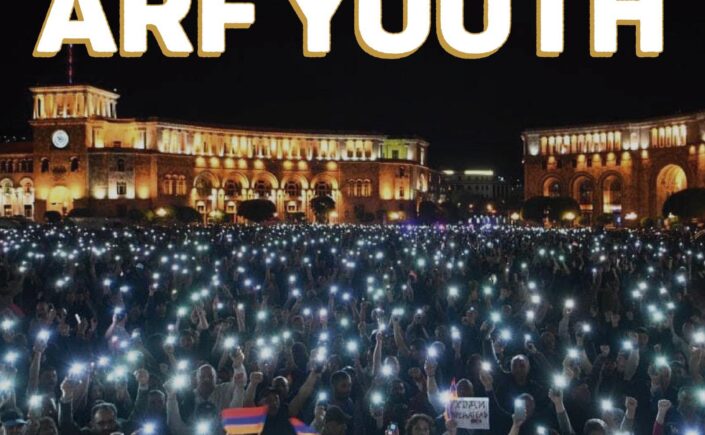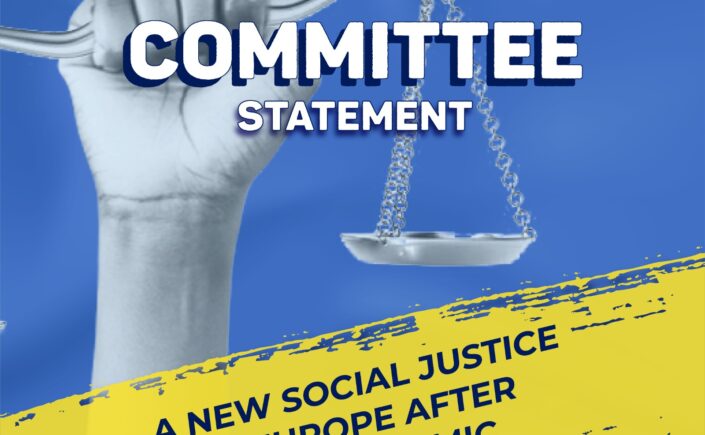– Español-
Desde la UNIÓN INTERNACIONAL DE JUVENTUDES SOCIALISTAS (IUSY) rechazamos y condenamos la grave conmoción social que se vive en Ecuador desde el 13 de junio. Desde que iniciaron las jornadas de protestas para exigir las justas demandas al gobierno la Alianza por los Derechos Humanos en el Ecuador registró, hasta el mediodía del 21 de junio del 2022, 39 vulneraciones de derechos humanos a lo largo y ancho del país. Ello se traducen en 79 detenciones, y más de 50 personas heridas. Así mismo, la represión ha dejado hasta la fecha dos víctimas mortales.
En este contexto, denunciamos el accionar violento de la fuerza pública ante las caravanas de personas que se han movilizado hacia Quito para que su voz sea escuchada y rechazamos la vil agresión dictatorial de intimidación al ordenar la militarización de la Casa de la Cultura Ecuatoriana y la sede de la Confederación Nacional de Organizaciones Campesinas, Indígenas y Negras (FENOCIN).
La grave conmoción social que se vive en Ecuador responde a un sinnúmero de problemáticas no resueltas por las administraciones gubernamentales durante los últimos años. Las diversas organizaciones agrario-campesinas, los sectores populares, feministas, ecologistas, estudiantes universitarios y secundarios que hoy se expresan en las calles, demandan al presidente Guillermo Lasso inversión en salud, educación, viabilidad, reactivación económica de los pequeños y medianos productores, condiciones justas para el trabajo y marcos normativos que permitan una vida digna a quienes menos tienen.
El actual presidente Lasso, con su agenda neoliberal, amenazó a las instituciones de educación superior con reducir aún más sus presupuestos, a fin de impedir que abran sus puertas al pueblo. Durante los últimos dos días, la policía nacional ha invadido los recintos de la Universidad Salesiana, la Escuela Politécnica Nacional, la Universidad de Cuenca y la Universidad Central del Ecuador. Las instituciones de educación superior han sido declaradas como zonas de paz y acopio; no obstante, se han registrado acciones que violentan la autonomía universitaria consagrada en la Constitución de la República en el artículo 355 y la Ley Orgánica de Educación Superior artículo 19.
En el marco del paro nacional, las acciones y omisiones del gobierno han elevado la conflictividad pues actúa con un doble discurso: mientras en comunicados, ruedas de prensa y declaraciones ante medios tradicionales, habla de diálogo y paz, en acciones concretas evidenciamos que la represión es forma de interactuar con quienes le exigen a la Función Ejecutiva respuestas claras ante sus demandas.
Por lo expuesto, rechazamos la permanente criminalización de la protesta social en Ecuador, y hacemos un llamado a la Comunidad Internacional y los organismos de Derechos Humanos para que pongan especial atención a lo que ocurre en el país.
IUSY statement on the serious social upheaval in Ecuador
– English-
The INTERNATIONAL UNION OF SOCIALIST YOUTH (IUSY) rejects and condemn the serious social commotion that has been taking place in Ecuador since June 13. Since the beginning of the protests, the Alliance for Human Rights in Ecuador registered, until midday on June 21, 39 violations of human rights throughout the country. This translates into 79 arrests, and more than 50 people injured. In addition, the repression has so far resulted in two fatalities.
In this context, we denounce the violent actions of the security forces against the caravans of people who have mobilized to Quito to make their voices heard and we reject the vile dictatorial aggression of intimidation by ordering the militarization of Casa de la Cultura Ecuatoriana and the headquarters of the National Confederation of Peasant, Indigenous and Black Organisations (FENOCIN, in Spanish).
The serious social unrest in Ecuador is the result of a number of problems that have not been solved by government administrations in recent years. The various agrarian-peasant organisations, the popular sectors, feminists, ecologists, university and secondary school students who are today expressing themselves in the streets, are demanding that President Guillermo Lasso invest in health, education, viability, economic reactivation of small and medium-sized producers, fair working conditions and regulatory frameworks that allow a dignified life for those who have the least.
Current president Lasso, and his government`s neoliberal agenda, threatened higher education institutions with further cuts in their budgets in order to prevent them from opening their doors to the people. For the past two days, the national police have invaded the campuses of the Salesian University, the National Polytechnic School, the University of Cuenca and the Central University of Ecuador. The higher education institutions have been declared zones of peace and collection; however, there have been actions that violate the university autonomy enshrined in the Constitution of the Republic in Article 355 and the Organic Law of Higher Education Article 19.
In the framework of the national strike, the actions and omissions of the government have increased the conflict because it acts with a double discourse: while in press conferences and statements to traditional media it speaks of dialogue and peace, in concrete actions we see that repression is the way to interact with those who demand clear answers to their demands from the Executive Function.
Therefore, we reject the permanent criminalisation of social protest in Ecuador, and we call on the international community and human rights organisations to pay special attention to what is happening in the country.
Déclaration de l’IUSY sur les graves bouleversements sociaux en Équateur
-en français-
Depuis l’UNION INTERNATIONALE DE LA JEUNESSE SOCIALISTE (IUSY), nous rejetons et condamnons la grave agitation sociale qui a lieu en Équateur depuis le 13 juin. Depuis le début des journées de protestation pour exiger des demandes justes au gouvernement, l’Alliance pour les droits de l’homme en Équateur a enregistré, jusqu’à midi le 21 juin 2022, 39 violations des droits de l’homme dans tout le pays. Cela se traduit par 79 arrestations, et plus de 50 personnes blessées. En outre, la répression a fait jusqu’à présent deux morts.
Dans ce contexte, nous dénonçons les actions violentes des forces de sécurité contre les caravanes de personnes qui se sont mobilisées vers Quito pour faire entendre leur voix et nous rejetons la vile agression dictatoriale d’intimidation en ordonnant la militarisation de la Casa de la Cultura Ecuatoriana et du siège de la Confédération nationale des organisations paysannes, indigènes et noires (FENOCIN, en espagnol).
La grave agitation sociale en Équateur est le résultat d’un certain nombre de problèmes qui n’ont pas été résolus par les administrations gouvernementales ces dernières années. Les différentes organisations agraires et paysannes, les secteurs populaires, les féministes, les écologistes, les étudiants des universités et des écoles secondaires qui s’expriment aujourd’hui dans les rues, exigent du président Guillermo Lasso qu’il investisse dans la santé, l’éducation, la viabilité, la réactivation économique des petits et moyens producteurs, des conditions de travail équitables et des cadres réglementaires qui permettent une vie digne à ceux qui ont le moins.
L’actuel président Lasso, avec son programme néolibéral, a menacé les établissements d’enseignement supérieur de nouvelles coupes dans leurs budgets afin de les empêcher d’ouvrir leurs portes à la population. Depuis deux jours, la police nationale a envahi les campus de l’université salésienne, de l’école polytechnique nationale, de l’université de Cuenca et de l’université centrale de l’Équateur. Les établissements d’enseignement supérieur ont été déclarés zones de paix et de collecte ; cependant, il y a eu des actions qui ont violé l’autonomie universitaire inscrite dans la Constitution de la République à l’article 355 et dans la loi organique de l’enseignement supérieur à l’article 19.
Dans le cadre de la grève nationale, les actions et les omissions du gouvernement ont augmenté le conflit car il agit avec un double discours : alors que dans les communiqués, les conférences de presse et les déclarations aux médias traditionnels, il parle de dialogue et de paix, dans les actions concrètes nous voyons que la répression est la manière d’interagir avec ceux qui exigent des réponses claires à leurs demandes de la part de la fonction exécutive.
Nous rejetons donc la criminalisation permanente de la protestation sociale en Équateur, et nous appelons la communauté internationale et les organisations de défense des droits de l’homme à accorder une attention particulière à ce qui se passe dans le pays.







